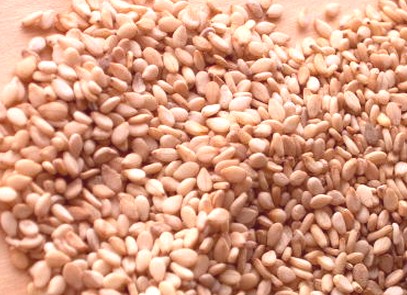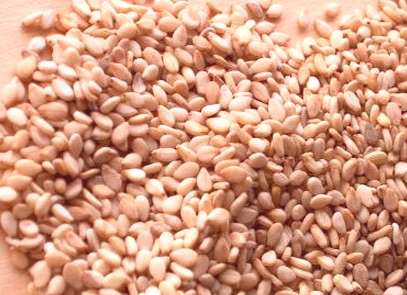Sesame seeds are obtained from the sesame plant which grows from about 1.6 to 3.3 feet in height. The sesame seeds are flat, tiny, oval shaped seeds that have a delicate and nutty flavor with an almost inaudible crunchiness to it. Depending on the type of sesame that has been harvested, sesame seeds can come in a variety of colors ranging from yellow to red to white to black. The sesame fruit tends to pop open on maturity and thus the sesame seeds can be obtained.
Sesame seeds are widely cultivated for sesame oil. The seeds themselves are used in a number of Middle Eastern and Indian cuisines.

History of Sesame seeds
Sesame seeds are the oldest known seeds that have been used to extract oil. Sesame plants have been known to grow wildly south of the African Sahara for many centuries. It was first domestically cultivated in India.
Sesame plant can grow in the very worst of conditions under intense heat and can survive with just the basic atmospheric moisture. Thus sesame seed plants can grow in conditions where most plants will wither and die away. Hence it is often referred to as the survivor crop.
The ancient Egyptians, Babylonians, the Turks and the ancient Indian Hindus used to harvest the sesame crop for its oil. Ancient Egyptian paintings have revealed the use of sesame oil by the bakers. India, China and Mexico are currently the largest producers of sesame seeds.
The sesame fruit magically bursts open to reveal the treasure of sesame seeds. It is believed that this is what resulted in the coining of the phrase ‘open sesame’ in the fable ‘Ali Baba and the Forty Thieves’
Health benefits of Sesame seeds
- Sesame seeds contain monounsaturated fats that are good for the health of the heart. It can aid the lowering of cholesterol and the levels of blood sugar. Also, blood clotting activities can be normalized by sesame seeds intake
- A major component of sesame seeds is protein. Protein is essential in the development of muscle mass and tissues. It can also aid on increasing the strength of the bones.
- Sesame seeds contain dietary fiber. Even though dietary fiber cannot be digested by the human body, a balanced consumption of soluble and insoluble fibers can regularize bowel movements and prevent the onset of digestive problems like diarrhea and constipation.
- Sesame seeds are rich in a number of minerals such as calcium, copper and magnesium. Calcium is known to be very good for bone health. Also, it plays an important role in the prevention of colon cancer, migraine, osteoarthritis, etc. Copper has antioxidant and anti-inflammatory qualities and can thus alleviate the pain and swelling caused due to bone disorders. Magnesium is known to promote respiratory and vascular health.
- Sesame seeds contain tryptophan which can help to reduce the symptoms of anxiety and stress.
Side effects of Sesame seeds
- Individuals who have food allergies and/or are allergic to different types of nuts such as peanuts, walnuts, etc. should avoid sesame seeds consumption as it can lead to an allergic reaction, thereby resulting in other medical complications. Hence, such individuals should always check the labels to verify the presence of sesame seeds in food items.
Nutritional information-Sesame seeds
|
Dried Sesame Seeds |
|
|
Nutritional value per 100 g |
|
| Energy | 630 kcal |
| – Sugars | 0.48 g |
| Carbohydrates | 11.73 g |
| Fat | 61.21 g |
| – Dietary fiber | 11.6 g |
| – Tryptophan | 0.330 g |
| Protein | 20.45 g |
| Zinc | 11.16 mg |
| Phosphorus | 667 mg |
| Sodium | 47 mg |
| Potassium | 370 mg |


